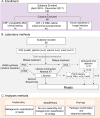Enhanced Virus Detection and Metagenomic Sequencing in Patients with Meningitis and Encephalitis
- PMID: 34465023
- PMCID: PMC8406231
- DOI: 10.1128/mBio.01143-21
Enhanced Virus Detection and Metagenomic Sequencing in Patients with Meningitis and Encephalitis
Abstract
Meningitis and encephalitis are leading causes of central nervous system (CNS) disease and often result in severe neurological compromise or death. Traditional diagnostic workflows largely rely on pathogen-specific tests, sometimes over days to weeks, whereas metagenomic next-generation sequencing (mNGS) profiles all nucleic acid in a sample. In this single-center, prospective study, 68 hospitalized patients with known (n = 44) or suspected (n = 24) CNS infections underwent mNGS from RNA and DNA to identify potential pathogens and also targeted sequencing of viruses using hybrid capture. Using a computational metagenomic classification pipeline based on KrakenUniq and BLAST, we detected pathogen nucleic acid in cerebrospinal fluid (CSF) from 22 subjects, 3 of whom had no clinical diagnosis by routine workup. Among subjects diagnosed with infection by serology and/or peripheral samples, we demonstrated the utility of mNGS to detect pathogen nucleic acid in CSF, importantly for the Ixodes scapularis tick-borne pathogens Powassan virus, Borrelia burgdorferi, and Anaplasma phagocytophilum. We also evaluated two methods to enhance the detection of viral nucleic acid, hybrid capture and methylated DNA depletion. Hybrid capture nearly universally increased viral read recovery. Although results for methylated DNA depletion were mixed, it allowed the detection of varicella-zoster virus DNA in two samples that were negative by standard mNGS. Overall, mNGS is a promising approach that can test for multiple pathogens simultaneously, with efficacy similar to that of pathogen-specific tests, and can uncover geographically relevant infectious CNS disease, such as tick-borne infections in New England. With further laboratory and computational enhancements, mNGS may become a mainstay of workup for encephalitis and meningitis. IMPORTANCE Meningitis and encephalitis are leading global causes of central nervous system (CNS) disability and mortality. Current diagnostic workflows remain inefficient, requiring costly pathogen-specific assays and sometimes invasive surgical procedures. Despite intensive diagnostic efforts, 40 to 60% of people with meningitis or encephalitis have no clear cause of CNS disease identified. As diagnostic uncertainty often leads to costly inappropriate therapies, the need for novel pathogen detection methods is paramount. Metagenomic next-generation sequencing (mNGS) offers the unique opportunity to circumvent these challenges using unbiased laboratory and computational methods. Here, we performed comprehensive mNGS from 68 prospectively enrolled patients with known (n = 44) or suspected (n = 24) CNS viral infection from a single center in New England and evaluated enhanced methods to improve the detection of CNS pathogens, including those not traditionally identified in the CNS by nucleic acid detection. Overall, our work helps elucidate how mNGS can become integrated into the diagnostic toolkit for CNS infections.
Keywords: encephalitis; hybrid capture; meningitis; metagenomic sequencing; methylated DNA depletion; next-generation sequencing (NGS); virus.
Figures




References
-
- McGill F, Griffiths MJ, Bonnett LJ, Geretti AM, Michael BD, Beeching NJ, McKee D, Scarlett P, Hart IJ, Mutton KJ, Jung A, Adan G, Gummery A, Sulaiman WAW, Ennis K, Martin AP, Haycox A, Miller A, Solomon T, UK Meningitis Study Investigators . 2018. Incidence, aetiology, and sequelae of viral meningitis in UK adults: a multicentre prospective observational cohort study. Lancet Infect Dis 18:992–1003. doi:10.1016/S1473-3099(18)30245-7. - DOI - PMC - PubMed
-
- Quist-Paulsen E, Ormaasen V, Kran A-MB, Dunlop O, Ueland PM, Ueland T, Eikeland R, Aukrust P, Nordenmark TH. 2019. Encephalitis and aseptic meningitis: short-term and long-term outcome, quality of life and neuropsychological functioning. Sci Rep 9:16158. doi:10.1038/s41598-019-52570-2. - DOI - PMC - PubMed
Publication types
MeSH terms
Grants and funding
LinkOut - more resources
Full Text Sources
Medical
Research Materials

